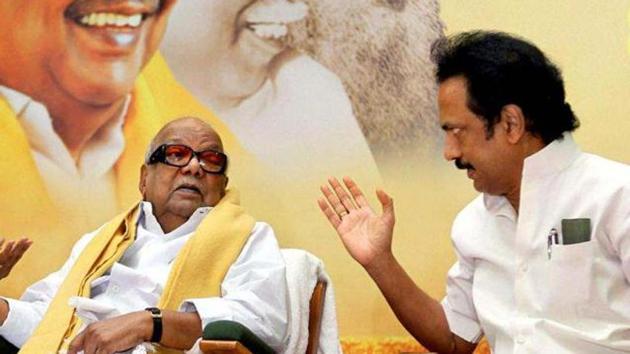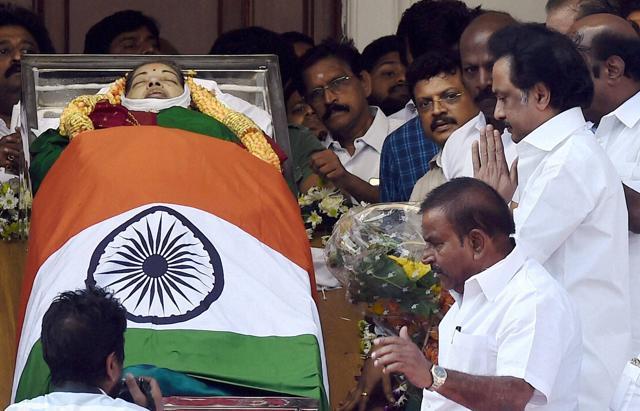In Tamil Nadu, the stars align in favour of MK Stalin
The appointment of MK Stalin as the working president of the DMK was expected. However, it gains significance because of the timing: The state has lost a powerful leader and Stalin could emerge as the political stalwart if he makes the right moves
On Wednesday, the DMK general council meet appointed MK Stalin, the party treasurer and son of party president M Karunanidhi, working-president of the party.

Given the various roles Stalin has been playing in the party, especially since 2013 when he was given more power to manage district-level affairs, the appointment was a mere formality and does not come as a surprise.
Karunanidhi, who has been the party leader since 1969, was not present at the general council meet. The 92-year-old five-time CM has been in poor health for some time now.
Read | Accepting new responsibility with heavy heart, says DMK working president Stalin
Three aspects need to be seen at this juncture: The timing of Stalin’s appointment, doubts of rebellion by his brother MK Alagiri, and whether the DMK should have ambitions of forming the government now.
First, the timing of Stalin’s appointment is significant and a lot depends on how he decides to lead the party. It comes at a very crucial time when the political Richter scale of Tamil Nadu is likely to swing dangerously.
The demise of former chief minister J Jayalalithaa, on December 5, has left the government and the AIADMK without a powerful leader. O Panneerselvam has taken over as CM and Sasikala Natarajan as party general secretary, but both do not command the respect nor wield the power Jaya did. The dual power centres (Jaya was both CM and party chief) have brought with it ambiguity and reports suggest that that there is restlessness within the rank and file of the AIADMK. All this works in Stalin’s favour because he is more popular and politically seasoned than Panneerselvam or Sasikala.
Read | Why Sasikala as Tamil Nadu CM could backfire on many fronts
However, Stalin’s elevation could be good news for Sasikala. The rivalry between Jaya and Karunanidhi was not just political. The bitterness between the two leaders often meant that there was little cooperation between the government and Opposition irrespective of which party was in power at Fort St George.
Moreover it was Karunanidhi, and not Stalin, who was seen as Jaya’s opponent. Similarly, Sasikala would be punching way above her weight if her rival was the DMK patriarch. In many ways Stalin and Sasikala, both next generation leaders in their own right, are in the same league. Sasikala would gain more political acceptance if she were to oppose Stalin, and that is exactly what she is doing. On Wednesday Sasikala accused Stalin of misrepresenting facts and insulting “Amma” on the Jallikattu (a bull taming event) ban.

Second, doubts that there could be a rebellion from Alagiri are ill-founded. Alagiri was expelled from the party in March 2014 for allegedly working against Stalin. Since then, Stalin has reinforced his position in the party and has extended his influence even in Madurai, once an Alagiri stronghold. Stalin started from the lower rungs and grew in the party, while Alagiri’s was more of a lateral entry. Stalin, much like Karunanidhi, is a leader who has worked his way up the DMK hierarchy.
Read | New rivalry in Dravidian politics sparks fireworks in Tamil Nadu
Third, there are growing calls within the DMK that the party should make the most of the disarray in the AIADMK and government following Jayalalithaa’s demise—even form a government if possible. That would be a bad move and Stalin should not heed such advice.
There are many reasons for this. Economists, like R Srinivasan of the University of Madras, argue that Tamil Nadu will likely experience a financial crunch which will grow worse now. Many parts of the state are facing drought-like conditions and footing the welfare schemes promised by the government will be a tough task. Once the GST is implemented,Tamil Nadu, which is a manufacturing hub, is likely to lose revenue in the initial period. Hypothetically, if the AIADMK government were to fall and Stalin forms a new one, he would be inheriting this financial crunch.
Read | Sasikala Natarajan: Jayalalithaa’s close aide, the power behind the throne
Stalin over the years has devoted considerable time to building the party. His election yatra before the 2014 general elections was a part of this effort. Ideally, for the next four years he should focus on further consolidating the party base.
Given these points, Stalin’s elevation as working-president of the DMK could not have come at a more appropriate time for the party and Stalin.
The AIADMK leadership will have to get its act right, the earlier the better. This is because with every passing day the cadre is getting further confused and demoralised. Stalin, in the meanwhile, can afford to wait and watch.
@VijuCherian





